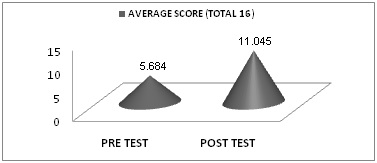Assessment of impact of health education on non communicable diseases on knowledge of intermediate college students
Abstract
Introduction: There has been a rapid rise in the prevalence of non communicable diseases. Still there is ignorance with regard to their prevention in the general population. Further the preventive measures are not covered in the school curriculum.
Objective: The study was done to provide information about the effectiveness of community-based health education on non communicable diseases among intermediate college students.
Methods: The cross sectional study was carried out at Government Intermediate College. A health education programme of the intermediate class students was conducted. The impact was evaluated by comparing the pre and post test proformas filled by 133 students. The proforma consisted of 16 questions related to different non communicable diseases. Care was being taken that the proformas were filled individually by students under the direct observation of the health educators. The proformas were then analysed using appropriate statistical techniques like percentage, paired t-test, chi-square test and p-value.
Results: The 16 questions proforma was grouped 4 under categories. In pre test 35.5% correct answers were obtained which increased to 69.0% in the post test. (p = 0.0000). Significant improvement in knowledge was seen in all categories of questions which included Cardiovascular disease (p = 0.0000); hypertension (p = 0.0000); diabetes (p = 0.0000) and obesity (p = 0.0000).
Conclusion: The findings of current study suggest that knowledge of students significantly improved after health education. Thus, health education programmes should regularly be conducted for improving the knowledge of students.
Downloads
References
2.World Health Organization. Global Status Report on Noncommunicable diseases 2014 [Internet] 2014 [cited 2019 Mar 30]. Available from: http://apps.who.int/iris/bitstream/10665/148114/1/ 9789241 564854_eng. pdf?ua=1
3. World Health Organization. Noncommunicable Diseases Country Profiles [Internet] 2014 [cited 2019 Mar 30]. Available from: http://apps.who.int/iris/bitstream/10665/128038/1/9789241507509_eng.pdf.
4. Srivastava R K, Bachani D. Burden of NCDs, Policies and Programme for Prevention and Control of NCDs in India. Indian J Community Med [Internet] 2011 [cited 2019 May 29];36, Suppl S1:7-12.[pubmed]
5. Harvard Initiative for Global Health The economic impact of Non-communicable Diseases in China and India: Estimates, projections and comparisons. 2013[Internet] 2013 [cited 2019 Mar 30].Available from: http://ftp.iza.org/dp7563.pdf.
6. World Health Organization. World Health Statistics [Internet] 2012 [cited 2019 Mar 30]. Available from: https://www.who.int/gho/publications/world_health_statistics/EN_WHS2012_Full.pdf
7. Ministry of Health and Family Welfare: National Action Plan and monitoring framework for prevention and control of Non-communicable Diseases in India.[Internet] 2012[cited 2019 Mar 30]. Available from: http://www.searo.who.int/india/topics/cardiovascular_diseases/National_Action_Plan_and_Monitoring_Framework_Prevention_NCDs.pdf?ua=1
8. Anjana RM, Pradeepa R, Deepa M, et al. Prevalence of diabetes and prediabetes (impaired fasting glucose and/or impaired glucose tolerance) in urban and rural India: phase I results of the Indian Council of Medical Research-INdiaDIABetes (ICMR-INDIAB) study. Diabetologia. 2011 Dec;54(12):3022-7. doi: 10.1007/s00125-011-2291-5. Epub 2011 Sep 30.[pubmed]
9. Mane KS, Maganalli A, Nawaz AS. A comparative study on awareness about non-communicable diseases and their risk factors among government and private high school students of Davangere city. Int J Med Sci Public Health 2016; 5(10): 2026-2029. DOI: 10.5455/ijmsph.2016.19022016396.
10. Divakaran B, Muttapillymyalil J, Sreedharan J, et al. Lifestyle riskfactors of noncommunicable diseases: awareness among school children. Indian J Cancer. 2010 Jul;47 Suppl 1:9-13. doi: 10.4103/0019-509X.63864.
11. Batlish R, Jadhav SL, Banerjee A. Coronary heart disease: awareness of risk factors and lifestyle among school-going adolescents. Indian J Med Sci. 2007 Aug;61(8):474-6.[pubmed]
12. George GM, Sharma KK, Ramakrishnan S, et al. A study of cardiovascular risk factors and its knowledge among school children of Delhi. Indian Heart J. 2014 May-Jun;66(3):263-71. doi: 10.1016/j.ihj.2014.03.003. Epub 2014 May 5.[pubmed]
13. Goel S, Singh A. Health awareness of high school students. Indian J Community Med [Internet] 2007 [cited 2019 Mar 30]; 32(3):192-4. Available from: http://www.ijcm.org.in/text.asp?2007/32/3/192/36825.
14. Ade A, Chethana KV, Mane A, Hiremath SG. Non-communicable diseases: Awareness of risk factors and lifestyle among rural adolescents. Int J Biol Med Res 2014; 5(2):3769-71. DOI: 10.4103/jdas.jdas_46_16.
15. Shivalli S, Gupta M, Mohaptra A, Srivastava R. Awareness of non communicable diseases and their risk factors among rural school children. Indian J Community Health [Internet] 31Dec 2012 [cited 2019 May 31]; 24(4):332-5. Available from: https://www.iapsmupuk.org/journal/index.php/IJCH/article/view/274.
16. Chaudhari AI, Rami K, Thakor N. Assessment of knowledge regarding noncommunicable diseases and their risk factors among students of higher secondary school: an interventional study. Int J Med Sci Public Health 2016; 5(1):115-118. DOI: 10.5455/ijmsph.2016.0108201540.
17. Lorga T, Aung MN, Naunboonruang P, et al. Knowledge of communicable and noncommunicable diseases among Karen ethnic high school students in rural Thasongyang, the far northwest of Thailand. Int J Gen Med. 2013 Jul 1;6:519-26. doi: 10.2147/IJGM.S44902. Print 2013.[pubmed]
18. Gupta RK, Kumari R, Hussain S, Raina SK, Langer B, Parveen Z. A cross-sectional study to evaluate awareness about noncommunicable diseases among rural adolescents in North West India. J Dent Allied Sci 2018; 7(2):60-4. DOI: 10.4103/jdas.jdas_46_16.
19. Chakma JK, Gupta S. Lifestyle practice and associated risk factors of noncommunicable diseases among the students of Delhi University. Int J Health Allied Sci 2017 Jan-Mar; 6(1):20-5.DOI: 10.4103/ijhas.IJHAS_34_16.
20. Shah V, Jain UJ, Thakor N. Impact of educational intervention regarding hazards of obesity and its preventive measures among students of commerce colleges of Ahmedabad city, Gujarat, India. Int J Res Med Sci 2016 Sep; 4(9):3820-3. DOI: 10.18203/23.

Copyright (c) 2019 Author (s). Published by Siddharth Health Research and Social Welfare Society

This work is licensed under a Creative Commons Attribution 4.0 International License.


 OAI - Open Archives Initiative
OAI - Open Archives Initiative


